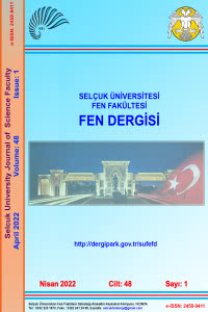AN ENSEMBLE INERTIA WEIGHT CALCULATION STRATEGY IN PARTICLE SWARM OPTIMIZATION ALGORITHM
Parçacık Sürü Optimizasyon Algoritmasında Bir Topluluk Atalet Ağırlığı Hesaplama Stratejisi
___
Ala’raj, M., Abbod, M.F., 2016, “Classifiers Consensus System Approach for Credit Scoring”, KnowledgeBased Systems, Vol. 104, pp. 89-105, doi:10.1016/j.knosys.2016.04.013Al-Hassan, W., Fayek, M.B., Shaheen, S.I., “Psosa: An Optimized Particle Swarm Technique for Solving the Urban Planning Problem”, In Computer Engineering and Systems, The 2006 International Conference on, Cairo, Egypt, pp. 401–405 5-7 Nov. 2006, IEEE, 2007.
Arasomwan, M.A., Adewumi, A.O., 2013, “On the Performance of Linear Decreasing Inertia Weight Particle Swarm Optimization for Global Optimization”, The Scientific World Journal. 2013.
Armano, G., Farmani, M.R., 2016, “Multiobjective Clustering Analysis Using Particle Swarm Optimization”, Expert Systems with Applications, Vol. 55, pp. 184–193, doi:10.1016/j.eswa.2016.02.009
Arumugam, M.S., Rao, MVC., 2006, “On the Performance of the Particle Swarm Optimization Algorithm with Various Inertia Weight Variants for Computing Optimal Control of a Class of Hybrid Systems”, Discrete Dynamics in Nature and Society.
Awad, N. H., Ali, M. Z., Liang, J. J., Qu, B. Y., Suganthan P. N., Problem Definitions and Evaluation Criteria for the CEC 2017 Special Session and Competition on Single Objective Bound Constrained RealParameter Numerical Optimization, Technical Report, Nanyang Technological University, Singapore, November 2016.
Bansal, J.C., Singh, P.K., Saraswat, M., Verma, A., Jadon, S.S., Abraham, A., 2011, “Inertia Weight Strategies in Particle Swarm Optimization”, In: Proceedings of Third World Congress on Nature and Biologically Inspired Computing (NaBIC-2011), Salamanca, Spain, pp 633–640, 19-21 October. 2011.
Bharti, K.K., Singh, P.K., 2016, “Opposition Chaotic Fitness Mutation Based Adaptive Inertia Weight BPSO for Feature Selection in Text Clustering”, Applied Soft Computing, Vol. 43, pp. 20-34.
Çavdar, T., 2016, “PSO Tuned ANFIS Equalizer Based on Fuzzy C-means Clustering Algorithm”, AEU - International Journal of Electronics and Communications, Vol. 70(6), pp. 799–807, doi:10.1016/j.aeue.2016.03.006.
Eberhart, R.C., Shi, Y., “Tracking and Optimizing Dynamic Systems with Particle Swarms”, In Evolutionary Computation, 2001. Proceedings of the 2001 Congress on, Seoul, South Korea, Vol. 1, pp. 94–100, 27-30 May 2001.
Feng, Y., Teng, G.F., Wang, A.X., Yao, Y.M., “Chaotic Inertia Weight in Particle Swarm Optimization”, In Innovative Computing, Information and Control, Kumamoto, Japan, 2007. ICICIC’07. Second International Conference on, page 475, 5-7 September 2007. IEEE, 2008.
Gheisari, S., Meybodi, M.R., 2016, “BNC-PSO: Structure Learning of Bayesian Networks by Particle Swarm Optimization”, Inform Sciences, Vol. 348, pp. 272-89.
Ho, Tin Kam, 1998, “The Random Subspace Method for Constructing Decision Forests”, IEEE Transactions on Pattern Analysis and Machine Intelligence, Vol. 20 (8), pp. 832–844. doi:10.1109/34.709601
Kennedy, J., Eberhart, R., “Particle Swarm Optimization”, Proc. IEEE Int. Conf. Neural Netw., 4 (1995), pp. 1942–1948.
Kordestani, J.K., Rezvanian, A., Meybodi, M.R., 2016, “An Efficient Oscillating Inertia Weight of Particle Swarm Optimisation for Tracking Optima in Dynamic Environments”, Journal of Experimental & Theoretical Artificial Intelligence, 2016, Vol. 28(1-2), pp.137-49.
Liang, Y., Leung, K.S, 2011, “Genetic Algorithm with Adaptive Elitist-Population Strategies for Multimodal Function Optimization”, Applied Soft Computing, Vol. 11(2), pp. 2017-34.
Lim, W.H., Isa, NAM., 2014, “An Adaptive two-layer Particle Swarm Optimization with Elitist Learning Strategy”, Information Sciences, Vol. 273, pp. 49-72.
Maca, P., Pech, P., 2015, “The Inertia Weight Updating Strategies in Particle Swarm Optimisation Based on the Beta Distribution”, Mathematical Problems in Engineering.
Nickabadi, A., Ebadzadeh, M.M., Safabakhsh, R., 2011, “A Novel Particle Swarm Optimization Algorithm with Adaptive Inertia Weight” Applied Soft Computing, Vol. 11(4), pp.3658-70.
Pluhacek, M., Senkerik, R., Davendra, D., Oplatkova, Z.K., Zelinka, I., 2013, “On the Behavior and Performance of Chaos Driven PSO Algorithm with Inertia Weight”, Computers & Mathematics with Applications, Vol. 66(2), pp.122-34.
Rokach, L., 2010, “Ensemble-based Classifiers”, Artificial Intelligence Review, Vol. 33 (1–2), pp.1–39.
Shi, Y., Eberhart, R., “A Modified Particle Swarm Optimizer”, In Evolutionary Computation Proceedings, 1998. IEEE World Congress on Computational Intelligence., The 1998 IEEE International Conference on, Anchorage, AK, USA, pp. 69–73, 4-9 May 1998.
Shi, Y.H., Eberhart, R.C., “Fuzzy Adaptive Particle Swarm Optimization”, Proc. of the IEEE Congress on Evolutionary Computation, Seoul Korea, Vol. 1, pp. 101–106, 27-30 May 2001.
Surjanovic, S., Bingham, D., 2013, Virtual Library of Simulation Experiments: Test Functions and Datasets, Retrieved May 13, 2016, from http://www.sfu.ca/~ssurjano.
Taherkhani, M., Safabakhsh, R., 2016, “A Novel Stability-Based Adaptive Inertia Weight for Particle Swarm Optimization”, Applied Soft Computing, Vol. 38, pp. 281-95.
Uymaz, S.A., Tezel, G., Yel, E., 2015, “Artificial Algae Algorithm (AAA) for Nonlinear Global Optimization”, Applied Soft Computing, Vol. 31, pp. 153-71.
Whitley, D., 1994, “A Genetic Algorithm Tutorial”, Statistics and Computing, Vol. 4, pp. 65-85.
Xiang, Y., Zhou, Y.R., Liu, H.L., 2015, “An Elitism Based Multi-Objective Artificial Bee Colony Algorithm”, European Journal of Operational Research, Vol. 245(1), pp. 168-93.
Xin, J., Chen, G., Hai, Y., “A Particle Swarm Optimizer with Multistage Linearly-Decreasing Inertia Weight”, In Computational Sciences and Optimization, 2009, CSO 2009, International Joint Conference on, Sanya, Hainan, China, Vol. 1, pp. 505–508, 24-26 April 2009.
Xu, G.L., Wan, S.P., Wang, F., Dong, J.Y., Zeng, Y.F., 2016, “Mathematical Programming Methods for Consistency and Consensus in Group Decision Making with Intuitionistic Fuzzy Preference Relations”, Knowledge-Based Systems, Vol. 98, pp.30-43.
Zang, W., Zhang, P., Zhou, C., Guo, L., 2014, “Comparative Study Between Incremental and Ensemble Learning on Data Streams: Case Study”, Journal of Big Data, Vol. 1 (1), pp.1–16.
Zhang, L.M., Tang. Y.G., Hua, C.C., Guan, X.P., 2015, “A New Particle Swarm Optimization Algorithm with Adaptive Inertia Weight based on Bayesian Techniques”, Applied Soft Computing, Vol. 28, pp. 138-49.
- ISSN: 2147-9364
- Yayın Aralığı: 2
- Başlangıç: 2013
- Yayıncı: Selçuk Üniversitesi Mühendislik Fakültesi
THERMAL SIMULATION SOFTWARE BASED ON EXCEL FOR SPACECRAFT APPLICATIONS
AN ENSEMBLE INERTIA WEIGHT CALCULATION STRATEGY IN PARTICLE SWARM OPTIMIZATION ALGORITHM
HESAPLAMALI AKIŞKAN DİNAMİĞİ İLE EKSENEL BİR ÇOCUK KALP DESTEK POMPASI PERFORMANSININ İNCELENMESİ
RAFET YAPICI, Resul TEKE, Ömer İNCEBAY, HASAN ÇINAR, FEHMİ MUTLU
Oktay Musa KAYIRGA, FATİH ALTUN
Emre ÜYETÜRK, NEJAN HUVAJ SARIHAN
BETON KAZIKLI AÇIK DENİZ YAPISININ ANALİZİ
ENGİN GÜCÜYEN, RECEP TUĞRUL ERDEM
LOKMAN GEMİ, Mehmet Alpaslan KÖROĞLU
DİJİTAL FOTOGRAMETRİ YÖNTEMİ İLE ZEMİN KAYMA YÜZEYLERİNİN BELİRLENMESİ
